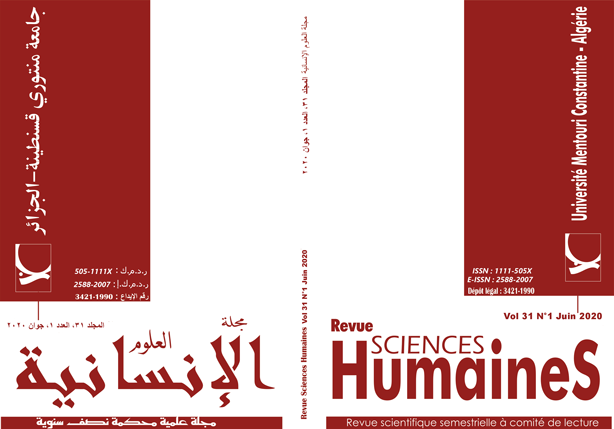L'effet du comportement de doute professionnel de l'auditeur externe sur l'amélioration de la qualité du contenu informationnel du rapport d'audit:
Une étude de terrain d'un échantillon de gouverneurs de comptes dans la wilaya de Tébessa
Mots-clés :
scepticisme professionnel, caractéristiques du scepticisme professionnel, qualité du contenu informationnel du rapportRésumé
Cette étude vise à démontrer l'impact du le scepticisme professionnel dans l'audit externe, sur l'amélioration de la qualité du contenu informationnel du rapport, Pour atteindre les objectifs de l'étude et répondre à ses questions, le questionnaire a été conçu pour collecter les informations, il a été distribué au commissaire aux comptes à Tébessa, et son analyse par le programme statistique SPSS. L'étude a conclu qu'il y a un impact et une relation avec un statistiquement significatif entre le scepticisme professionnel de l'auditeur et la qualité du contenu de l'information du rapport.
Téléchargements
Références
(1)_ Bell, T. B., Peecher, M. E., & Solomon, I. The 21st Century Public Company Audit: Conceptuals Elements of KPMG's Global Audit Methodology: KPMG international,2005.
(2)_ Hurtt, R. K. Development of a scale to measure professional skepticism. Auditing: A Journal of Practice & Theory, 29(1), 2010, 149-171.
(3)_ Endrawes, M, Professional sceptisicm of auditors: a cross-cultural experiment. (Doctor of Philosophy (Accounting)), University of Western Sydney. ,2010.
(4)_ Bowlin, K. O., Hobson, J. L., & Piercey, M. D, The effects of auditor rotation, professional skepticism, and interactions with managers on audit quality. The Accounting Review, 90(4), 2015.
(5)_ Board, I. A. a. A. S. Overall Objective of the Independent Auditor and the Conduct of an Audit in accordance with International Standards on Auditing International Standard on Auditing 200,2009,p09.
(6)- Glover, S. M., & Prawitt, D, FEnhancing auditor professional skepticism: The professional skepticism continuum. Current Issues in Auditing, 8(2) ,2014 P2
(7)_ Rasso, J. T. Psychological distance: The relation between construals, mindsets, and professional skepticism. (Thesis submitted to gain the degree of "Doctor of philosophy"), University of south Florid.,2013 ,p15.
(8)_ Nelson, M. W, A model and literature review of professional skepticism in auditing. Auditing: A Journal of Practice & Theory, 28(2),2009, p04.
(9)_ Louwers, T. J., Henry, E., Reed, B. J., & Gordon, E. A, Deficiencies in auditing related-party transactions: Insights from AAERs. Current Issues in Auditing, 2(2),2008, p16.
(10)_ Saksena, P, Four tools (under the umbrella of continuous improvement) to help auditors prevent/detect frauds. Paper presented at the Allied Academies International Conference. Academy of Accounting and Financial Studies. Proceedings,2008, p29.
(11)_ Hurtt, R. K, Op.Cit, p154.
(12)_ Toba, Y. Toward a conceptual framework of professional skepticism in auditing. Waseda Business & Economic Studies, 47,2011, p94.
(13)_ Peytcheva, M, Professional skepticism and auditor cognitive performance in a hypothesis-testing task. Managerial Auditing Journal, 2014, p17.
(14)_ Dimitrova, J., & Sorova, A. (2016). The Role of Professional Skepticism in Financial Statement Audit and its Appropriate Application. Journal of Economics, 1(2), 2016, p 06.
(15)_ Ibid, p06.
(16)_ Ibid, p08.
(17)_ Carpenter, T. D., & Reimers, J. L. , Professional skepticism: The effects of a partner's influence and the level of fraud indicators on auditors' fraud judgments and actions. Behavioral Research in Accounting, 25(2), 2013, p51.
(18)_ Gloeck, J. D., & De Jager, H, The Audit Expectation Gap in the Republic of South Africa: School of Accountancy, University of Pretoria,1993, p57.
Téléchargements
Publié-e
Comment citer
Numéro
Rubrique
Licence

Cette œuvre est sous licence Creative Commons Attribution - Pas d'Utilisation Commerciale - Partage dans les Mêmes Conditions 4.0 International.
















